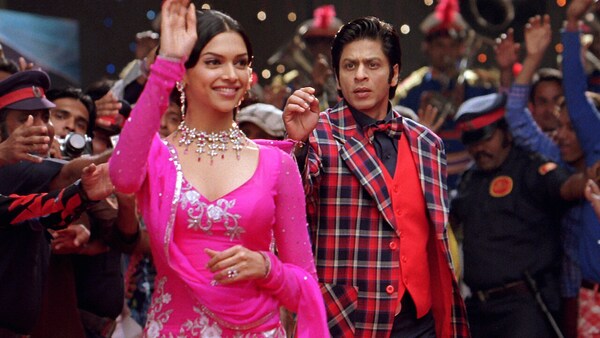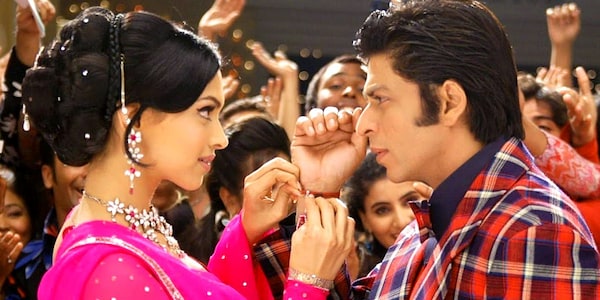The Overlooked Genius of Om Shanti Om

- Aamatullah Rajkotwala
Film Companion
Last Updated: 05.30 PM, Sep 02, 2022

Om Shanti Om is a loved film. It is typically regarded as entertaining, easy to watch and full of memorable dialogues and iconic songs. In true Bollywood fashion, it transcends genres and apparently logic, coalescing into a 3-hour long romantic-comedy-action-musical that is so ridiculous, so over-the-top and so utterly silly that you can’t hate it if you tried. It was the highest-grossing film of the year and one that not only launched Deepika Padukone into stardom (where she has since remained), but I would wager also transformed the careers and reputations of everyone associated with it for the better. With its celebrity cameos (of unprecedented number), its 8-pack-sporting Shah Rukh Khan and its ek chutki sindhoor, this “mainstream entertainer” made a home in our collective memories and desi hearts, where even today, it is revisited with a great deal of fondness.
So why am I spending my precious hours (days even) rambling on about this film?
Because I think Om Shanti Om is not just another iconic film- it’s a postmodern masterpiece.
As a film set against the film industry (past and present), with a plot revolving around the making and remaking of a film, Om Shanti Om has more references in its screenplay than minutes in its runtime. Being quite literally filled to the brim with pastiche, allusion, quotation and parody, it manages to be both a loving homage and a scathing critique of the industry in the same breath.
Some of these references are quite easy to pick up on, like the fact that Shanti Priya (Padukone) as Dreamy Girl is a nod to Hema Malini’s Dream Girl, and the dialogue “no sorry, no thank you” is a reference to the iconic line from Sooraj Barjatya’s Maine Pyaar Kiya (1989). The song, “Dhoom Tana” in itself is a long tribute to the films, music, actors and costumes of the 70s with impeccable attention to detail. The “Bhaagoo” scene where Om (Khan) jumps into the fire to save Shanti is inspired by a real-life incident on the sets of Mother India (1957) where Nargis was actually trapped and surrounded by fire, and Sunil Dutt jumped in to save her. (Then they got married!)
From the title (taken from Karz [1980] – also a film about reincarnation and revenge) to the passing remarks Om and Pappu (Shreyas Talpade) make about the power of surnames in the industry – everything alludes to something more. Bollywood history constantly intrudes into the narrative, lining the story with extra-diegetic information that transforms the experience of watching the film.
In “The Death of the Author”, an essay by Roland Barthes, he described the text as “a tissue of quotations drawn from the innumerable centres of culture”, meaning that every text is made up of other texts, and perhaps nothing can truly be “original”. Nowhere is this more apparent than in Om Shanti Om– a film that intends to be inspired by other films. With Bollywood’s well-established tendency of ‘borrowing’ and altering plots without any acknowledgement of the sources they were taken from, Om Shanti Om’s blatant intertextuality and self-awareness, make it bold, refreshing and sneakily subversive in a way that mainstream films no longer even attempt to be.
But the genius doesn’t end there. Or perhaps I should say picture abhi baaki hai mere dost!
There’s a popular notion that a good film will make you forget that you’re watching a film. It will allow you to suspend your disbelief and draw you into the plot and characters to the extent that for a few hours, you become part of their reality and not your own. Om Shanti Om takes this time-honoured criterion and throws it right out of the window.

It goes above and beyond to draw attention to its own construct, breaking our willing suspension of disbelief and constantly reminding us that what we are viewing is undeniably made up. It’s a work of metafiction that puts the entire Marvel Cinematic Universe to shame. The real film industry and the fictional one in Om Shanti Om are deliberately indistinguishable from each other. They are interwoven and overlapping not only to create a sense of déjà vu and nostalgia for Indian (and NRI) audiences but also to tease and challenge us, further extending the scope of interpretive activity.
To put it simply, Farah Khan knows all too well who’s coming to watch, and the entire film is an elaborate inside joke between her and her audience- executed to perfection.
The first wink and nudge from her (in a very long list) comes just 2 minutes into the film. The opening scene reconstructs the shooting of Rishi Kapoor’s iconic song Om Shanti Om on the sets of Karz in 1977. We see our protagonist Om Prakash arguing with a woman in the audience over Rishi Kapoor’s jacket. He sarcastically asks her “Tu director hai kya film ki? (Are you the director of the film?)” to which she responds “Main director hoti to pehle tereko bahar phekti (Had I been the director, I would have thrown you off the set)”. The audience chuckles knowingly because we are well aware that she is in fact the director, Farah Khan. The boundary between the real and fictional film industries becomes even more blurry once we enter 2007 or what was then the present tense.
When Om waves to his crazed fans from his balcony, he is no longer Om Kapoor or even Om Prakash. He is SRK. When “Deewangi Deewangi” rolls around, the actors are there to celebrate the King of Bollywood.
The nuance of the song lies in its choreography and editing. We find comfort in the knowledge that Khan and Kajol just did their iconic handshake from Kuch Kuch Hota Hai (1998) and the utter unexpected joy of seeing Salman Khan, Saif Ali Khan and Sanjay Dutt in the same frame, dancing like brothers. All the actors deliberately behave in ways that we recognise, doing iconic steps from past films, and playing into their well-established personas (think Mithun, Govinda and Rekha). The song truly sells the idea that the industry we know and love is just one big happy family. It is designed to make you feel a surge of love and familiarity, of nostalgia and longing.
The Filmfare Awards segment is a rare and bizarre instance where Bollywood celebrities seem to have abandoned their diplomatic tendencies, choosing instead to laugh at themselves (and insisting we do the same!)
Shabana Azmi pokes fun at her reputation of being serious and political when she says she’s only here to protest the clearing of slums. A-list actors Akshay Kumar and Abhishek Bachchan become jealous and arrogant caricatures of themselves, driven to greed over the coveted award. All the actresses use the “we’re just good friends” line in reference to Om Kapoor, mocking the flimsy way in which celebrity flings are covered up. Later with the nominations, Khan’s own filmography is reduced to slow-mo montages of women running into his open arms (He, once again, plays Rahul. Naam toh suna hi hoga?)
Om Shanti Om takes everything laughable and absurd about Bollywood and blows it out of proportion. Overdramatic mothers, evil producers and odds-defying heroes. It refuses to be taken seriously and yet if you look carefully beneath its light-hearted and well-intentioned frills, you will find a bottomless pit of subversion.
Let me conclude by coming back to my first claim that Om Shanti Om is a loved film. But why?
Its true genius has to lie in the way it rejects all attempts to define itself. I loved Om Shanti Om when I first watched it as a seven-year-old (90% of the jokes and references went over my head), and I love it today, at twenty-two, after having watched it countless times, studied every single reference and given a presentation on it. I still get goosebumps when Tabu shows up in her red saree. My heart swells watching all the technicians, makeup artists, and choreographers and crew members walk the red carpet in the credits. I will never get tired of the story in a story in a story masterpiece song- “Dastaan-E-Om Shanti Om”.
The movie is loved because it’s filled to the brim with heart. It will make you laugh no matter who you are, or what kind of films you like.

 Premium
Premium